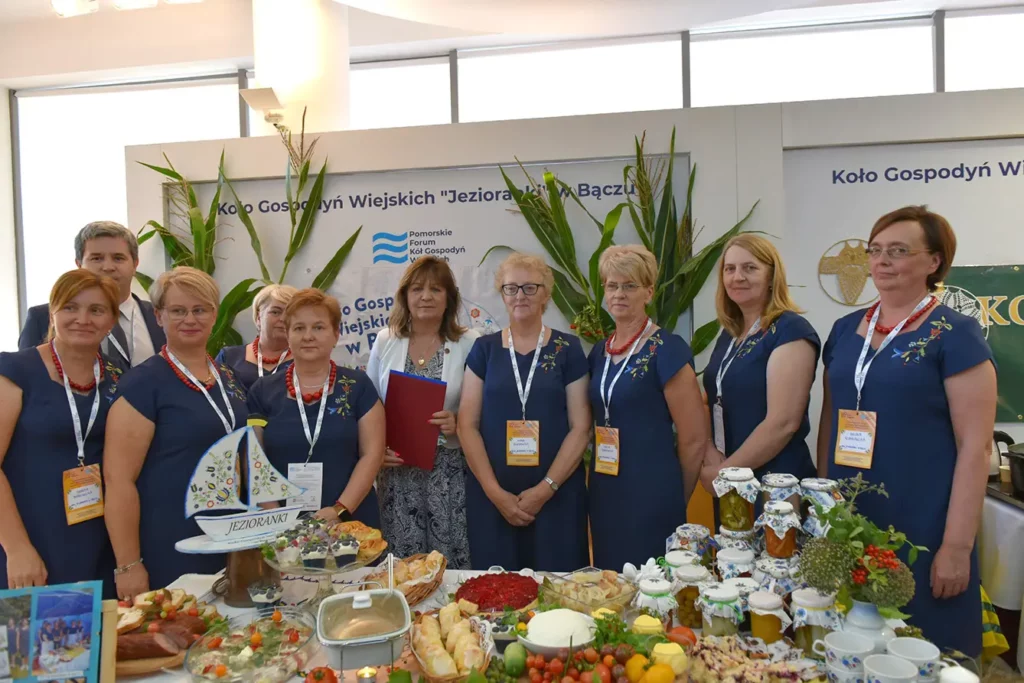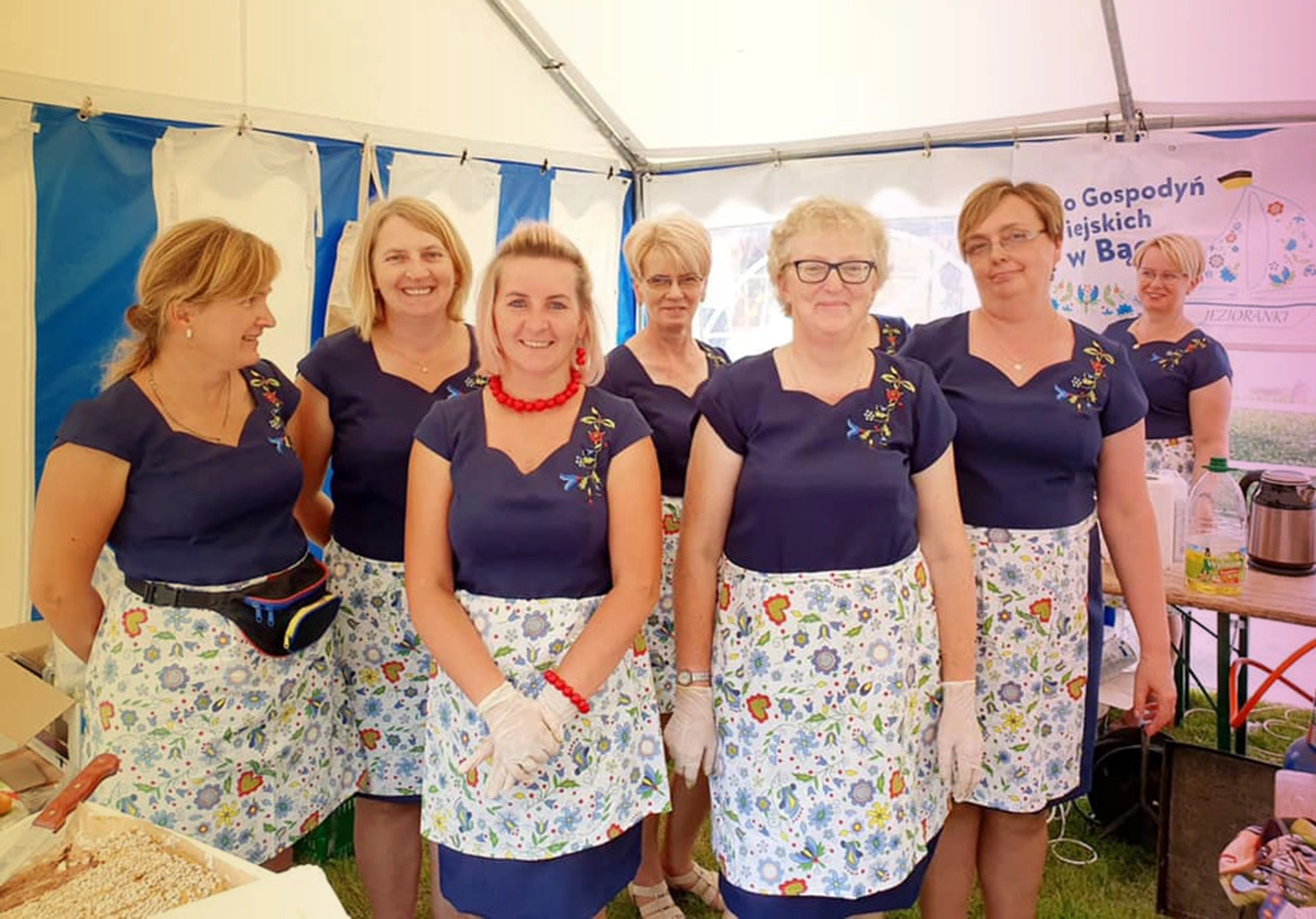Women’s rights are something that we tend to take for granted. It seems too easy to forget that it took a long time for women to achieve visible success in their fight for equal treatment. And it did not happen centuries ago. In fact, in Poland, women were granted their voting rights very early on, in 1918 (for comparison – France, the land of the Revolution, decided to take this step as late as 1944.
More so – until the end of 1965, a married woman in France could not open a bank account or start a job without her husband’s permission.) From today’s perspective, it seems bizarre, especially if we consider women’s incredible involvement in shaping the reality of everyday life. It all makes the history and the existence of the Polish Rural Women Clubs [Koła Gospodyń Wiejskich] even more interesting and pivotal.
Two Women with One Vision
The first organization that resembled the structure of a Rural Women Club was started by a landlady, Januaria Kalkstein, in 1866 – more than 50 years before voting rights were granted to Polish women. Her Housewives Association (Towarzystwo Gospodyń) was created in Piaseczno (Gdańsk Pomerania) with a mission to teach the women skills necessary for running the homestead on their own.
If you have seen the ‘Cold Mountain’ starring Nicole Kidman and Renée Zellweger, you can understand how crucial it was to equip women with knowledge beyond sewing or preserves-making. And it was far from obvious back then! Eleven years later, in 1877, Filipina Płaskowicka, a teacher and an activist, started the first official Rural Women Club in Janisławice. The trend went viral and spread throughout the country, becoming a stronghold for traditions, interpersonal ties, and a point of local support.
Get to know the Real-Deal
We could talk about the organizational principles, laws, and regulations behind such Clubs, but I believe it’s best to go to the source and give a voice back to the women working so hard in their communities. I have spoken to Ms. Mirosława Bobkowska, the leader of the Jezioranki Women’s Club in Bącz (Kashubia region in the North of Poland). I wanted to hear what her involvement in the Club means for her, her friends, and the local community.

Her answers are a solid testimony to how vital such organizations still are. Jezioranki is a perfect example that Polish Women’s Clubs are not a relic of the past but a network of organizations that are still expanding. Ms. Bobkowska came forth with the initiative to create the Club in her village. She had some experience, as she told me she previously assisted her friends in a neighboring Mirachowo with all the formalities when starting their local club. “I could not join as I did not live in Mirachowo,” she explains. “And so, the idea of starting a Club in my area has been playing at the back of my mind for quite some time. Especially after I was elected a councilor to the Kartuzy City Council.”
Rural Women’s Clubs are still in demand
“Our Club was founded in 2019, after the changes introduced by the Agency of Restructuring and Modernisation of Agriculture,” Ms. Mirosława says. “Additionally, the Ministry of Agriculture was supporting the creation of such Clubs with a grant dedicated to the activities of the Club,” she explains. When asked whether she would then say that the State government still supports the activities of such Clubs, she wholeheartedly agreed and added: “For sure, the help from the Agency is very important. As well as the financial grants.”
One hundred years later, still supporting women
“From what my mum has told me, I know that in the past, such Clubs were parts of the Agricultural Clubs [these clubs were gathering local farmers]. As times were extremely difficult, such Women’s Clubs allowed their members to cope with everyday struggles, for example, arranging seeds or buying chickens. Very practical help. These days, we can provide women with even more opportunities for personal growth and development. We invite guests and organize meetings to talk about interesting topics, are involved in our local community’s life, and keep the local Kashubian traditions alive. I also think the willingness to be a part of a group is an important factor motivating the members. We are stronger as a group. We can support each other in our daily hardships.”
Since providing support was one of the main reasons why the first founders came up with the idea of the Clubs, I wanted to check if Ms. Miroslawa would find that it is true to say that Clubs still play an important part in giving 21st-century women a feeling of empowerment, helping them realize they have a positive and very tangible influence on their local communities, safeguard the traditions. “Yes. I would definitely agree that the Clubs are necessary and that they do emphasize the strength women possess and encourage them to use it.”
Animating local communities
One of my grandmothers lives in a small village in Kashubia. As a child, I remember she took me to a local event organized by the women of one of the local Rural Clubs. I still remember that afternoon and how important it was to the local community, with virtually the entire village participating in the activities prepared. I have since seen similar events more recently and wanted to check if Ms. Mirosława agrees that the Clubs still play an important role in the life of their communities.
“Oh, but of course!” she agrees without hesitation. “We, too, organize events. The other month, we held a bike trip with some Nordic Walking exercises. Immediately afterward, a big family fair took place to mark the end of a project our Club ran. With a grant from the local Authorities in Kartuzy, we started a challenge called Walk for Your Health [Marsz po zdrowie]. A series of Nordic Walking events, led by qualified instructors, took the willing members of our community for walks in our beautiful forests of the Mirachowo Region. The idea of the program came after the pandemic. People became so secluded, so closed in their homes. We wanted to motivate them to go out and get together. You see, when we started our Club, we started with a bang. And then comes the pandemic.”
Jump at the deep end
Despite the outbreak of Covid-19 and the fact that Jezioranki is a young Club, compared to some other ones, Ms. Mirosława can already mention several cyclical events they proudly take part in and organize.
“Every year, we organize a village fair. That’s a chance for our Club to show off our culinary potential, and we offer specialties prepared by our members to the community. As I have said, we were founded relatively recently; however, each year, we join in a fundraiser for building a children’s hospice in Kartuzy. We bake cakes which are then auctioned by those attending the event, and the funds go to support the cause. Perhaps that’s not such a spectacular thing to do, but we are trying to join in and give our bit to the community. We also actively participate in other events. Most recently, we took part in the Pomeranian Forum of Rural Women Clubs in Gdynia, where our stand received a prize.”
When women grow – the community grows
“Why did you need your Club in the first place? What made you start it?” I ask. “Well, firstly, we wanted to keep our beautiful Kashubian traditions alive. We wanted to look after all those neglected items, such as Kashubian porcelain, embroidered garments, Kashubian tableware, and local art. We collect them – even though, at present, we do not have any headquarters yet. We wanted to look after our local heritage. We also wanted to integrate.”
“After decades of communist regime and poverty in the countryside, our society became very closed. There were no more village meetings. People would not integrate. Thanks to our Club, our small village of 300 inhabitants is a more active community. Our Club is eleven-strong. Eleven wonderful, active women who complement each other. We are able to carry out such projects and prepare events which would not be possible without the existence of our Club.”
I smile and ask one last provocative question. “Ms. Mirosława, so who needs the Clubs more – the women, who create them, or the communities they are active in?” It doesn’t take long for her to give me the following answer: “I think everyone needs such Clubs. They are important for the women who get together and act together, thanks to them. It is essential to our psychological well-being to leave the house and change the setting once in a while. And on the other hand, the presence of such Clubs positively influences the communities. Like it is the case with our Club and Bącz. Our events promote our village and our culture. Also, by exchanging our thoughts and experiences, we are able to introduce new elements into our lives.”







